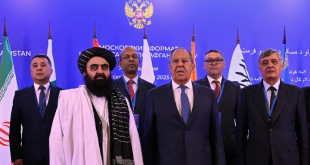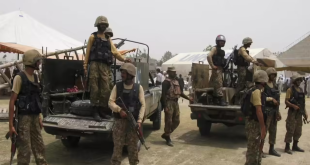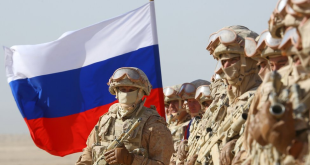KABUL — The Afghan Taliban have formally requested the United States transfer control of Afghanistan’s embassy in Washington to their administration, marking a bold diplomatic move aimed at breaking their international isolation and securing formal recognition.
Zabiullah Mujahid, spokesperson for Afghanistan’s interim government, announced the demand during an interview with Afghan National Television on Sunday. He emphasized ongoing communication between Taliban officials and U.S. representatives, citing recent visits and meetings in Kabul, Qatar, and other locations.
“We have requested official recognition from them and have also raised the issue of transferring the Afghan Embassy in the United States to us,” Mujahid said. “Although we have not received a positive response, the people of Afghanistan want their rights.”
The embassy in Washington has remained in diplomatic limbo since the fall of the U.S.-backed Ashraf Ghani government in August 2021. Control of the embassy is a crucial symbol of legitimacy and a practical gateway for engaging with the international community.
Mujahid called on other nations to follow Russia’s example, which has taken steps to engage with the Taliban government, urging broader international acceptance to facilitate Afghanistan’s integration into global diplomacy.
Despite these overtures, the United States has not officially recognized the Taliban-led administration, reflecting deep concerns over the group’s governance, especially its severe restrictions on women’s rights and education. Since seizing power, the Taliban have barred women and girls from secondary and higher education, imposed strict dress codes, limited female employment, and curtailed women’s freedom of movement—measures that have drawn widespread condemnation.
The U.S. and international community have linked formal recognition to concrete progress on human rights, governance, and counterterrorism commitments. Mujahid acknowledged the lack of a positive U.S. response but pointed to recent pragmatic cooperation, such as prisoner exchanges, as signs of a possible thaw.
Afghanistan’s security remains fragile, with threats from militant groups like ISIS-Khorasan and the Tehrik-i-Taliban Pakistan. Enhanced U.S.-Afghan coordination could bolster counterterrorism efforts and help stabilize the volatile region.
The Taliban’s diplomatic push also aims to ease strained relations with neighboring countries amid border disputes, water rights issues, and refugee flows. Formal recognition and dialogue could pave the way for improved regional stability.
As the Taliban navigate this complex diplomatic landscape, their demand for control of the Afghan embassy in Washington underscores a high-stakes gamble: seeking legitimacy on the world stage while facing intense scrutiny over human rights and governance challenges.
 Afghanistan Times Latest News and Analysis from Afghanistan and the Region
Afghanistan Times Latest News and Analysis from Afghanistan and the Region




